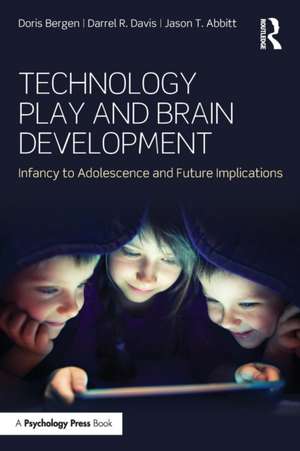Technology Play and Brain Development: Infancy to Adolescence and Future Implications
Autor Doris Bergen, Darrel R. Davis, Jason T. Abbitten Limba Engleză Paperback – sep 2015
| Toate formatele și edițiile | Preț | Express |
|---|---|---|
| Paperback (1) | 440.77 lei 6-8 săpt. | |
| Taylor & Francis – sep 2015 | 440.77 lei 6-8 săpt. | |
| Hardback (1) | 997.90 lei 6-8 săpt. | |
| Taylor & Francis – 28 sep 2015 | 997.90 lei 6-8 săpt. |
Preț: 440.77 lei
Nou
Puncte Express: 661
Preț estimativ în valută:
84.34€ • 88.07$ • 69.65£
84.34€ • 88.07$ • 69.65£
Carte tipărită la comandă
Livrare economică 15-29 aprilie
Preluare comenzi: 021 569.72.76
Specificații
ISBN-13: 9781848724778
ISBN-10: 1848724772
Pagini: 168
Dimensiuni: 152 x 229 x 10 mm
Greutate: 0.25 kg
Ediția:1
Editura: Taylor & Francis
Colecția Routledge
Locul publicării:Oxford, United Kingdom
ISBN-10: 1848724772
Pagini: 168
Dimensiuni: 152 x 229 x 10 mm
Greutate: 0.25 kg
Ediția:1
Editura: Taylor & Francis
Colecția Routledge
Locul publicării:Oxford, United Kingdom
Cuprins
1. Brain Maturation and Typical Play Development from Infancy through Adolescence: Complimentary Dynamic Processes with Technology
2. Changes in Play Environments with Advent of Technology-Augmented Play Materials: Representation Modes and Affordances within Physical and Virtual Contexts
3. Potential Influences of Representation Modes and Affordances on Various Types of Technology-Augmented Play: Gains and Losses 4. Comparing Developmental Influences of Technology-Augmented Play: Researchers, Parents, and Children’s Perspectives 5. Predicting the Brain/Play/Technology Interface in Future Society: Implications for Human Development 6. Facilitating Optimum Brain Maturation and Play Development in a Technologically Diverse Society: Roles of Technology Designers, Community Stakeholders, Educators, and Parents
Epilogue Glossary of Brain and Nervous System Terms
2. Changes in Play Environments with Advent of Technology-Augmented Play Materials: Representation Modes and Affordances within Physical and Virtual Contexts
3. Potential Influences of Representation Modes and Affordances on Various Types of Technology-Augmented Play: Gains and Losses 4. Comparing Developmental Influences of Technology-Augmented Play: Researchers, Parents, and Children’s Perspectives 5. Predicting the Brain/Play/Technology Interface in Future Society: Implications for Human Development 6. Facilitating Optimum Brain Maturation and Play Development in a Technologically Diverse Society: Roles of Technology Designers, Community Stakeholders, Educators, and Parents
Epilogue Glossary of Brain and Nervous System Terms
Notă biografică
Doris Bergen is Distinguished Professor Emerita at Miami University. Her research focuses on play theory, humor development, effects of technology-augmented play, and ERP effects during videogame play. As a child she preferred play with blocks, making "small worlds," and now she enjoys using her spatial skills to take down iPad block tower structures.
Darrel R. Davis is an Associate Professor at Miami University. His research interests include the effects of technology-related play and the use of technology in diverse educational settings. As a child he loved to play with action figures and toy vehicles and now prefers outdoor activities and participating in team sports.
Jason T. Abbitt is an Associate Professor at Miami University. He is an educator and researcher focused on helping educators use technology for teaching and learning. His favorite forms of play involve building and tinkering, from his use of Legos and Erector sets as a child to a focus on coding and microcontrollers today.
Darrel R. Davis is an Associate Professor at Miami University. His research interests include the effects of technology-related play and the use of technology in diverse educational settings. As a child he loved to play with action figures and toy vehicles and now prefers outdoor activities and participating in team sports.
Jason T. Abbitt is an Associate Professor at Miami University. He is an educator and researcher focused on helping educators use technology for teaching and learning. His favorite forms of play involve building and tinkering, from his use of Legos and Erector sets as a child to a focus on coding and microcontrollers today.
Descriere
Technology Play and Brain Development brings together current research on play development, learning technology, and brain development.














